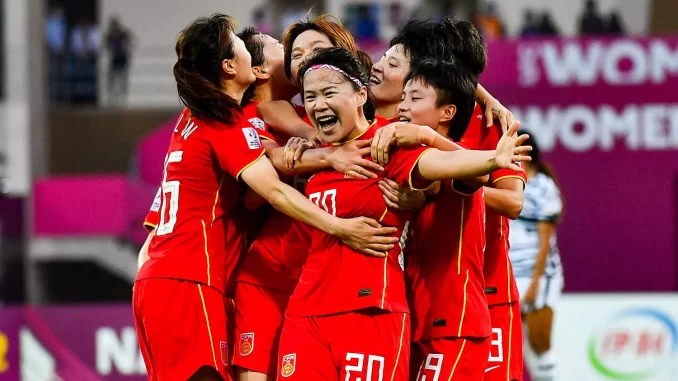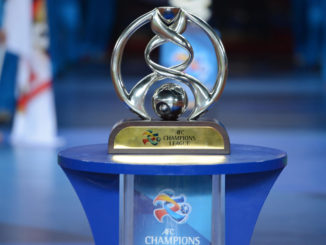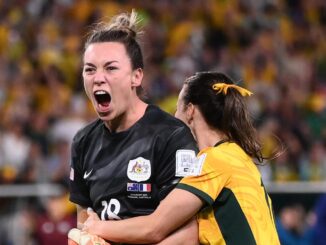

China return to the FIFA Women’s World Cup finals with the tag of Asian champions, Shui Qingxia’s side reclaiming the Women’s Asian Cup crown in India in January last year to end a run of 16 years without the title for the nation that had long been the continent’s dominant force.
Their 3-2 victory over South Korea in the final in Navi Mumbai returned the trophy to Beijing for a ninth time and finally restored the Chinese to preeminence in Asia as they extended their remarkable record in the competition and qualified for a sixth Women’s World Cup.
China’s dominance has receded throughout the last two decades, with the improvement of the game in Japan and the strength of North Korean coupled with the arrival of Australia as an Asian Football Confederation member in 2006 impacting on the nation’s superiority.
The Women’s Asian Cup win was a welcome return to the pinnacle after a lengthy slump that, at its nadir, had seen the Chinese miss out on qualification for the 2011 Women’s World Cup in Germany as well as for the 2012 Olympic Games.
That was a significant fall for a nation that had won the silver medal at the 1996 Olympic Games and also finished as runners-up at the 1999 Women’s World Cup, losing to the United States on both occasions.
But while their American rivals have remained at the summit of the female game, China have had to rebuild and climb back to claim a position among the leading nations, with coach Shui playing a key role in creating a team capable of matching the best.
“Chinese fans will undoubtedly have higher expectations for our team after we won the Asian Cup,” Shui said as she named her 23-player squad for the finals. “It’s beneficial for the team.
“We aim to set a loftier goal of reaching the quarter-finals in Australia. However, we must understand that the World Cup and Asian Cup are entirely different, it’s going to be much more challenging.
“Experiencing my first World Cup as a head coach, I do feel nervous at times. I hope I can maintain my composure and assist my players in building confidence.”
The Chinese are only too aware of the gulf that now exists between the leading nations in Asia and the top teams in the global game.
The Steel Roses suffered a pair of heavy defeats in their last appearance on a similar stage, Jia Xiuquan’s squad losing 5-0 to Brazil before an 8-2 thumping at the hands of the Netherlands in the group stages of the Olympic Games in Japan in 2021.
Those performances, though, were the catalyst for change within the set-up, with Jia eventually moved aside and replaced by Shui following her success domestically in China.
Shui oversaw a considerable turnaround at the Women’s Asian Cup, navigating her team through a group that featured Iran and Chinese Taipei before victory over Vietnam in the quarter-finals secured a place the Women’s World Cup.
From there the Chinese notched up a surprise penalty shoot-out win over heavily fancied Japan and that 3-2 win over the South Koreans, with Xiao Yuyi hitting a 93rd minute winner after Tang Jiali and Zhang Linyan had helped overturn a two-goal halftime deficit.
Embed from Getty ImagesShui has continued to shape her squad since, securing a runners-up spot at the 2022 EAFF E-1 Championship, drawing with both the South Koreans and hosts Japan on route to that second-place finish.
Results during the preparations for their Women’s World Cup challenge have been mixed, with draws against Ireland and Switzerland bookended by heavy losses against Sweden and Spain.
Those performances and the challenges they are due to face in a group featuring European champions England as well as Denmark and Haiti mean Shui’s chances of leading her team to the quarter-finals could be considered hopeful rather than a certainty.
THE COACH – SHUI QINGXIA
Appointed in November 2021 after the country’s disastrous performance at the Olympic Games in Japan the preceding summer, Shui Qingxia has brought the knowledge and experience gained during a stellar playing career to the dug out of the Steel Roses.
A talented midfielder who featured in the side that won the silver medal at the 1996 Olympic Games as well as five Women’s Asian Cup titles, Shui missed out on the run to the final of the Women’s World Cup three years later due to injury.
The 56-year-old hung her boots up after the 2000 Olympic Games, when China were knocked out in the quarter-finals, and moved into coaching, developing a reputation as an astute tactician capable of motivating and nurturing the players under her care.
Embed from Getty ImagesAs a precursor to her appointment as national team head coach, Shui led a squad featuring many of the country’s key players to gold at China’s National Games in Shaanxi in September 2021 and two months later she was handed the reigns of the senior side following the departure of the divisive Jia Xiuquan.
That has proven to be an astute appointment. Shui built on her success on the domestic scene with the unexpected win at the Women’s Asian Cup within three months of starting in the role.
“The young players nowadays are much different; they are more sensitive,” Shui said recently. “One sentence and even one special tone may have different kinds of impact on them. What they need more is encouragement.”
Shui’s sympathetic approach has paid off so far, and she takes her team into the Women’s World Cup looking to be positive.
“No matter what unfolds in the World Cup,” she said, “I hope my players can face challenges with a smile and demonstrate China’s fighting spirit to all our fans.”
PLAYERS TO WATCH
Wang Shanshan
Captain Wang Shanshan has shown her versatility playing for China, leading her nation to their first Women’s Asian Cup in 16 years in India last year while playing as a central defender having previously shone as a striker.
The 33-year-old carved out her reputation in attack and it was as a forward that she featured at the 2015 Women’s World Cup. She scored twice for her country, including the only goal in the 1-0 win over Cameroon in the Round of 16.
Her efforts in leading China to the Women’s Asian Cup – where she was named the Most Valuable Player – were rewarded when she returned to her hometown, Luoyang, where she was gifted an apartment by the local government in recognition of her achievements.
Li Mengwen
Li Mengwen comes into the Women’s World Cup off the back of a season-long loan with French side Paris Saint-Germain, where the versatile fullback – she can play on either side of the defence – established herself as a regular in the squad.
Her move to Europe came after impressing for China at the EAFF E-1 Championship and with Jiangsu in the Chinese Women’s Super League where her former coach, Jocelyn Precheur, recommended Li to her father, Gerard, the current coach of the PSG team.
A fluent English speaker, 28-year-old Li was born in Suzhou and was a 400 metre runner in her youth before switching to football.
Wang Shuang
Talismanic striker Wang Shuang has a reputation as an early developer, making her debut for China’s under 17 team at the age of 12 and first playing for the senior national team five years later, facing off against Canada in a 1-0 defeat weeks before her 18th birthday.
Embed from Getty ImagesShe scored her first international goal against Argentina in December 2014 – then aged 19 – and has since gone on to find the net 43 times, with her talents attracting the attention of Paris Saint-Germain, where she played for a season from midway through 2018.
Now turning out for Racing Louisville in the National Women’s Soccer League in the United States, Wang is one of China’s most potent attacking weapons, with the 28-year-old scoring five times in the run to the Women’s Asian Cup title in 2022.
Listen to The Asian Game Podcast as we preview China’s campaign at the FIFA Women’s World Cup 2023




